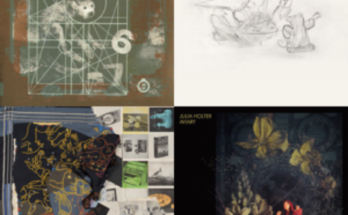The wait is finally over. Arcade Fire have released their fourth album, Reflektor, on Merge. The album, overall, marks a point of departure from The Suburbs. Reflektor shows that the band has embraced a more rounded musical style, and has more charged and upbeat moments packed into 85 minutes than any of their past albums.
The album reflects thoughtful production. In addition to the staple members of Win and Will Butler, Regine Chassagne, Richard Reed Parry, Jeremy Gara, and Tim Kingsbury, the band credits a dream team of sorts in the album notes. Most notably, James Murphy produced most of the album. Reflektor, as could be expected, employs orchestral contributions from Sarah Neufeld, Marika Shaw, and Owen Pallet, as well as some saxophone contributions from Colin Stetson. The band also credits Markus Dravs, who has worked with the band in the past.
Reflektor continues Arcade Fire’s tendency to sing out lyrics that are somewhat straightforward, but still very emotional and piercing. Unlike on past albums, Win Butler leads all of the songs on this one, but Chassagne’s back-up vocal contributions complement his voice perfectly. There are also plenty of moments when the rest of the band joins in together in their familiar style of collectively pushing through the songs.
While the album offers a lot to analyze right off the bat, the album really starts to pick up momentum about half way through Part 1, during “Here Comes the Night Time.” The song starts off at a danceable tempo, and weaves exposed piano notes and raw bass notes with a synthesized organ build-up. In addition to its worthy musical attributes, the song also presents a complex struggle, but broken down into innocent lyrics. Butler tackles the issue of religious rigidity by asking, “If there’s no music up in heaven then what’s it for?” Further into the song, the group suddenly speeds up in a rock frenzy, repeatedly chanting “Here comes the night time,” before switching back to the original tempo. The outburst could serve as a representative of the band’s current position. They have a bigger following than ever, and are facing bigger expectations than ever, but they still want to have some fun without being bound to the characteristics that people want to see in them.
Such sentiment is carried over to the next song, “Normal Person,” which features purposely unpolished notes, and starts with Butler sighing into the microphone. He sings about the tension of being expected to be one thing, when he feels like another. The song sounds like an antiestablishment anthem in the making, as Butler sings, “Never really ever met a normal person like you. How do you do?” and, “when they get excited they try to hide it. Look at those normals go.”
On “Joan of Arc,” the band starts off with such a quick tempo that it sounds like they are all being chased, or angrily chasing someone else. Then the heavy bass kicks in, and the band switches to a more reasonable speed. The song could easily fit in with their older work, particularly Neon Bible, but it also pushes the band forward. They sing with a confidence that is ironic in a song about faithfully following a leader, and they each display their individuality in the song. Chassagne’s layered vocals drift through the song, giving it the feel of a fast-paced lullaby, while Gara smashes the drums with a fierceness that does not always come through on their older albums.
“Joan of Arc” ends the first part of the double-album, before “Here Comes the Night Time II” leads into the second part. On this short song, Butler sings tenderly, “I hurt myself again, along with all my friends. Feels like it never ends. Here comes the night again.” The strings accompany his and Chassagne’s voices with increasing fervor, building anticipation for the remainder of the album.
“Awful Sound (Oh Eurydice)” is one of the slowest songs on the album, but its gentle approach to heartbreak and love keeps the song interesting, and it unfolds at the most appropriate place in the album. Layered over the moving hand-beaten drums and persistent bass beats is a steadily-strummed acoustic guitar, which lends a hopeful tone to the song. The song also, however, breaks into a literal awful sound of screeching ruckus, past the halfway point. The sound builds before cutting off entirely, resembling a tension being resolved through devotion and honesty.
The most striking and memorable guitar riff on the album occurs during “It’s Never Over (Hey Orpheus),” which follows “Awful Sound.” The guitar cuts in after a short bass and synth build-up, and it shows that Arcade Fire have not lost their ability to write darkly catchy, but simple melodies. The song provides a deep and intense counterpart to “Awful Sound,” perhaps to represent the band’s inspiration from the Orpheus and Eurydice myth, and the story’s tragic outcome. Butler sings, “Hey Eurydice, can you see me. I will sing your name until you’re sick of me.” Then other members join in, singing, “Just wait until it’s over. Just wait until it’s through.” The lyrics appear to be an allusion to the story, in which Orpheus must resist looking at Eurydice during their journey from the underworld. He fails and Eurydice is sent back to the underworld, leaving Orpheus, the world’s best musician, feeling devastated. The lyrics, however, can be easily applied to modern reality, along with the other lyrics throughout the album.
“Afterlife” carries the album along with a mystical vibe, as members hum over the sound of the clanky keyboards and the steady drumbeat, which moves at a pace similar to “Reflektor.” The song is reflective of the past, but the band also uses its space to consider what may come with the future. The band then wraps the album up with “Supersymmetry,” which clocks in at over eleven minutes long. The song continues the mystical vibe, and has a dreamlike quality. Butler and Chassagne carefully guide each other through the song, as the instrumentation slowly builds up, and then takes over altogether for a couple of minutes. The song ends after several minutes of miscellaneous noises, and serves as a reminder that the band, while putting more effort into heavy production, is still willing to surprise, possibly even annoy, listeners.
The album reflects a monumental amount of work, as well as the benefits of collaboration. It is neither a weak Suburbs sequel, nor does it introduce any new elements that are outrageous. It carries the band’s much-loved characteristics, with reliably thoughtful orchestration, perfectly imperfect vocals, and tough rock force. It also, however, shows the band’s willingness to delve into sensitive areas. The songs are tender, without carrying the grieving tones of songs on Funeral and Neon Bible. The lyrics are also critical of many things in society, but without being aggressively accusatory. Arcade Fire gives off the impression that they see problems in the world, but they are still figuring out where they stand on each issue. And trying to figure out where we stand is a part of life that people can relate to.
Rating: W-P-G-U (Out of W-P-G-U)
Key Tracks: “It’s Never Over (Hey Orpheus),” “Here Comes the Night Time,” “Joan of Arc”
RIYL: the National, David Bowie, Andrew Bird
Stream Reflektor Below:




